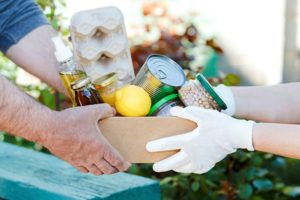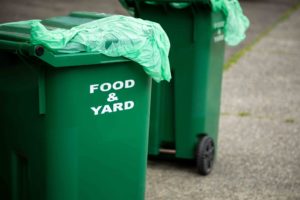
Source: instagram.com
According to the EPA, the food waste we produce and send to landfill is the third largest source of human-related methane emissions in the US. Methane is a greenhouse gas that is 25 times more damaging than carbon dioxide, and since the industrial revolution, there has been a 250% increase in the amount of this gas in the atmosphere. Around one-fifth of all municipal solid waste we generate in the US each year is food, and more than 40 million tons of it ends up in landfill in the US alone.
However, the food waste issue is compounded by the fact that people are also going hungry. According to Feeding America, almost 750,000 people in New Jersey suffer from hunger, with more than 200,000 of them being children. When you consider that roughly two-thirds of all the food we throw away is still edible, this makes the issue of food waste even harder to stomach. In New Jersey specifically, according to the New Jersey Department of Environmental Protection, 1.3 million tons of food waste was sent to landfills and incinerators in 2017 alone—food that might have otherwise been redirected for donation.
Then there are the financial implications of food waste. Around 30% to 40% of all food produced in the US ends up in the trash, at a cost of around $1,600 per family, per year. National food waste in landfill adds up to almost $50 billion a year, a significant portion of the $750 billion lost annually to this particular waste stream.
The problem of how to control food waste in NJ is a serious one that needs to be tackled head-on. Worryingly, recycling in New Jersey has been going in the wrong direction over the last two decades. In the early 1990’s, the city recycled over 50% of municipal and household waste, but by 2019 this had dropped to just 37.1% (the national average is 32.1%) and some counties are down even further.
So, what is being done to reverse these overall trends and recycle food waste in New Jersey?
Source: shop.zerowaste.com
The best way to deal with food waste in New Jersey? Use less.
Changing our attitude toward food is the key to managing food waste in NJ. We need to learn to buy less and buy smarter, using food in more creative and efficient ways, aiming to throw less in the trash.
The New Jersey state government has also created a guide on food waste at a residential level, which covers shopping, storing, and composting to help reduce waste and increase organics recycling. In addition, retailers and other small businesses can discover how to implement best practices and reduce food waste by using this Retail Food Waste Action Guide.
What to do with leftover food waste in NJ — The next step
Good intentions are great, but sometimes excess food or waste is unavoidable. If you do have leftovers or excess, remember that 68% of food that goes to landfill is still edible and that nearly three-quarters of a million people in NJ are food insecure. Connecting these two problems are food pantry organizations, and there are dozens across the state aiming to transfer edible but unwanted food to those who really need it. You can find food pantries in your area on this list.
In addition, small businesses don’t need to worry about liability when donating food thanks to the Good Samaritan Food Donation Act which absolves them of responsibility for donations made in good faith. This allows for the donation of edible food to non-profit organizations and distributors with exemption from any criminal and civil liability.
How to recycle food scraps in New Jersey: Composting is key
Of course, not all food is still edible or suitable for donation, and you should always check with your local food pantry on suitable food types before donating. For waste that is unsuitable for human consumption, the next step is to compost. If you have space and resources, you can start a home composting bin, and the Composting Council of New Jersey has plenty of resources to help you get started. Additionally, the Environmental Protection Agency (EPA) has an excellent guide on composting along with links to further resources.
If you don’t have space to compost at home, you can work with many of the community composting projects starting up across the state, such as this program in Jersey City.
Another option in Hoboken provides four sites for residents to drop off food scraps and organic waste, and the city has also pioneered one of New Jersey’s first residential composting programs. Small private composting companies do offer curbside collection in various locations across the state for a fee, but there is currently no statewide collection facility in place. This generally places the onus for composting on residents’ shoulders.
Recycling commercial food waste in New Jersey
Some good news for composting was announced in 2020, with New Jersey joining six other states and several cities across the US in enacting food waste recycling laws. Governor Phil Murphy and Senator Bob Smith, among others, passed the food waste bill in the Senate on April 14th, with the mandate set to come into effect in October 2021. Some of the finer details of the law remain to be settled but New Jersey aims to reap the benefits of large-scale composting by tackling some of its biggest generators.

The legislation requires ‘large food waste generators’ including commercial and institutional entities (those which generate at least 52 tons of food waste each year at a single location) to source separate food waste and recycle it at an appropriate facility. Supporting this is the “Alternative Authorized Food Waste Recycling Method” that allows non-Class C certified locations to process food waste using certain on-site recycling methods, such as on-site composting or anaerobic digestion, as well as shipping food waste off-site for agricultural use.
The new legislation aims to boost composting in NJ by:
- Creating a Food Waste Recycling Market Development Council to provide advice
- Requiring state departments to use compost, mulch, or other soil amendments generated from the recycling of organic materials when feasible
- Providing a financial incentive for energy generated at a food waste recycling facility
The bill has caused some controversy in terms of what exactly constitutes recycling food waste. While it looks like the debate over whether landfills with gas capture should count as organic recycling may continue for years, the bill is at least a step in recognizing the issue across the state and its various municipalities.
What to do with food waste in New Jersey: A summary
Food waste is a big issue in New Jersey, as it is in the rest of the US. City curbside composting programs are having some success in places like Jersey City, diverting 50,000 pounds of food waste from landfill in the first two years, but access to these programs is limited to just a few locations. In general, residents are restricted to home composting or the use of paid composting pick-ups.
While the state has implemented laws to enforce larger waste producers to prioritize waste reduction and increase composting, discussions over the exact definition of composting and recycling continue to hold back its efficacy. The good news is, there are alternatives for businesses and community groups looking to move towards zero waste.
At RTS, we provide solutions that allow New Jersey businesses to customize waste and sustainability services to meet specific requirements. Everything we do is fully compliant with all statewide regulations on food waste, and we offer the choice of on-demand collections and recurring services for all kinds of waste, as well as training and sustainability strategies to help you achieve your zero-waste goals.
Get in touch with our TRUE Advisors today to discuss your current waste management operations and learn how your business can optimize and improve all waste streams today.




